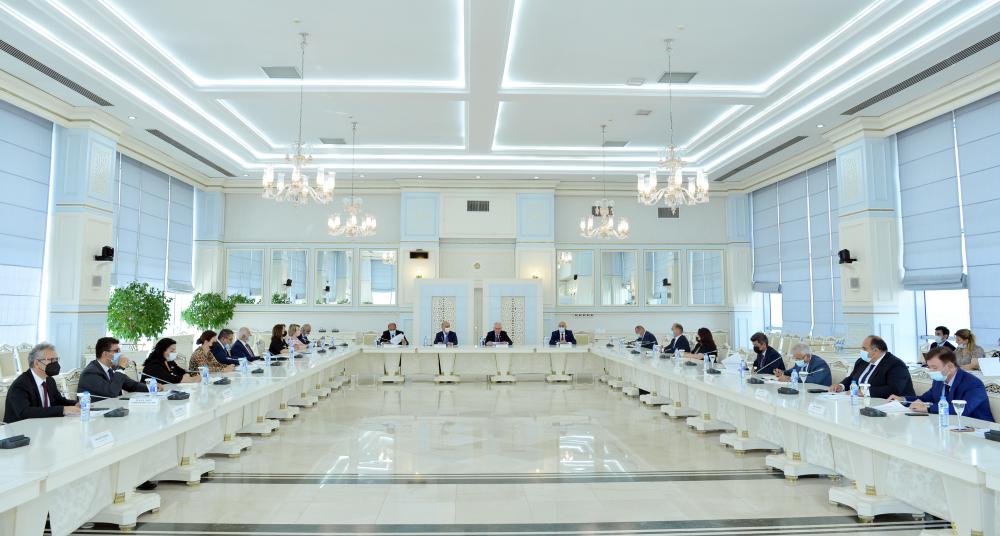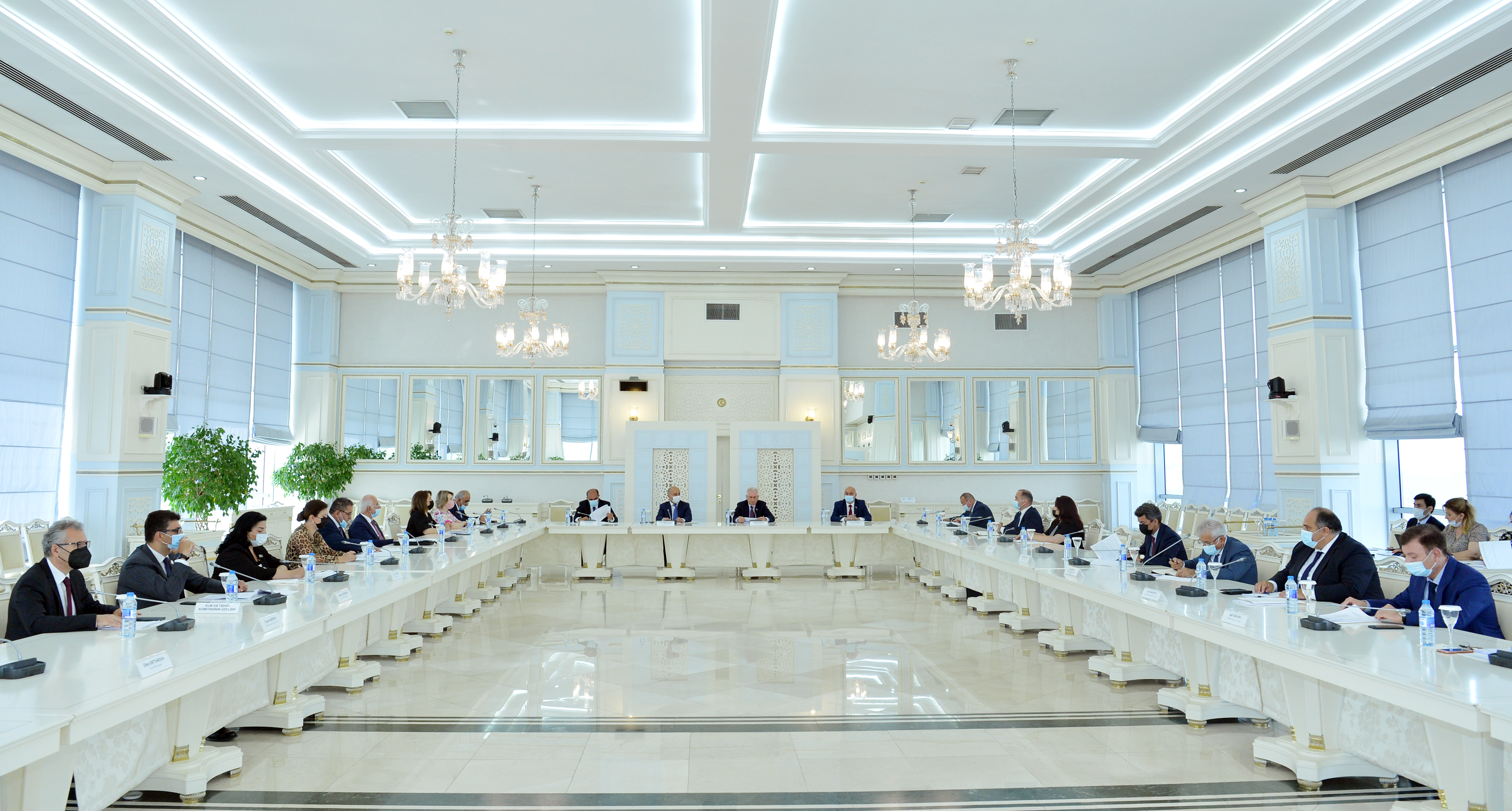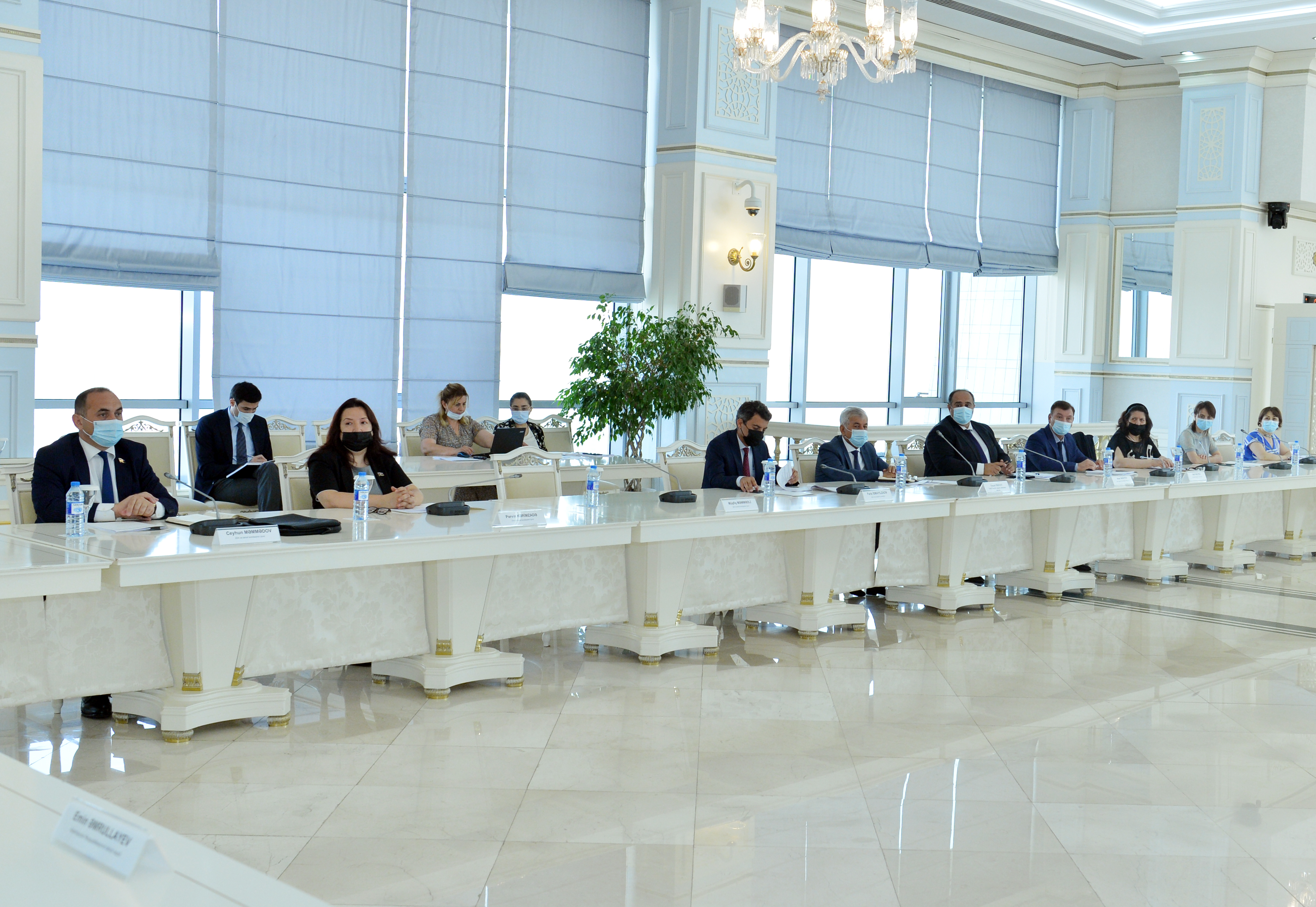Tertiary Education Bill Discussed at Milli Majlis

The Milli Majlis Committee for Sciences and Education and the Working Group for the drafting of the Tertiary Education Bill had a joint meeting on 29 June.
Committee Chairman and Working Group Leader Bakhtiyar Aliyev remarked whilst opening the combined meeting that our country had a modern education system honed to ensure transmission of knowledge and experience down the generations. The foundation of the up-to-date system that meets the 21st century challenges and fit to support the economic growth of our independent states was laid by the national leader Heydar Aliyev, Bakhtiyar Aliyev noted.
The deliberate policy in this field is now being continued by President Ilham Aliyev successfully and, as for the steps being taken, a special place is assigned amongst them to the Bologna Process, which is why the Head of the State has passed a crucial decision connected to it. That was done to further the evolution of tertiary education in Azerbaijan and to train the specialists who will be granted free access to the European educational realm. Azerbaijan joined the Bologna Process on 9 May 2005 thus pre-defining the direction and scope of the then-contemplated tertiary education reforms. The Ministry of Education and the Cabinet of Ministers have since then passed many appropriate resolutions and carried out a large amount of work to rebuild the tertiary education in order to implement the Bologna Declaration postulations.
President Ilham Aliyev signed on 31 January 2008 the edict ‘On Certain Measures to Integrate the Tertiary Educational Institutions of the Azerbaijan Republic into the European Educational System’. Many of the matters addressed in that document have materialised by now; the President of the Republic has signed off The State Programme of the Education System IT Penetration in the Azerbaijan Republic in 2008-2012, The State Programme of the Azeri Youth Studies Abroad for 2007-2015 and The State Programme of Tertiary Education Reforms in the Azerbaijan Republic during 2009-2013. The adoption of the state education development strategy of Azerbaijan shaped the new lines of progress and further accelerated the on-going reforms.
The Committee Chairman mentioned the Presidential Decree of 16 November 2018 affirming The State Programme of Higher International Competitiveness of the Tertiary Education System of the Azerbaijan Republic for 2019-2023 emphatically. Because, Mr Aliyev explained, the Tertiary Education Bill now tabled outlines the scope that the Head of the State assigned to the tertiary education system and, at the same time, purports to build the basics for emergence of competitive higher education institutions as well as for supplying the rapid reforms conducted in the country with the HR potential that they require.
The huge support extended to the progress of education in Azerbaijan by the Heydar Aliyev Foundation was brought up as well. Numerous projects were implemented under the umbrella of the New School for the Renovating Azerbaijan programme started at the instance of the Foundation.
It is evidently required to form a regulatory and legal platform in the context of the education reforms afoot in the country as well as within each adopted state programme. The parliamentary Committee for Sciences and Education formed the Working Group tasked with composing the Tertiary Education Bill in September 2019. That was done with the purpose of continuing the tertiary education’s evolution and accelerating the relevant reforms. The Working Group was made up of the Committee members, heads of the appropriate departments of the Milli Majlis Staff, representatives of the Ministry of Education, university rectors and education experts. The Group members have worked fruitfully and have held many a discussion since then.
There was a group convention at the suggestion and with the attendance of Chair of the Milli Majlis Sahiba Gafarova in January this year. Minister for Education Emin Amrullayev, Chair of the Board of Directors of the State Examinations Centre Public Legal Entity Maleyka Abbaszade, members of the Milli Majlis Sciences and Education Committee, officials of the concerned state departments and experts took part in that gathering.
Returning to the Bill in question, it consists of 9 chapters and 54 articles.
Shaping an innovative, creative, independent-minded and patriotic person is one of the paramount tasks that lie ahead. As they worked on the draft law, the Working Group scrutinised and analysed the national experience, the European national laws on higher education and the provisions of the pertaining international conventions. The new Bill contains a legal framework for reworking Azerbaijan’s tertiary education and adapting it wholly to the European educational space with due consideration to be given to the experience garnered in the country, the national moral values and the definite need to protect the national education system. It follows from the Bill that tertiary education will have four tiers. It will be possible to collect credit points to move from one tier to another, to determine educational terms and define professional standards adequate to market demands complete with composition of educational programmes based on such standards.
Minister for Education Emin Amrullayev who was present at the meeting said that the Bill was of utmost importance in terms of addressing the material challenges put to the education system of Azerbaijan. The country has joined several international conventions concerned with higher education. Here, Mr Amrullayev pointed out, the ultimate goals are to ensure that higher education is accessible and high-quality with reliance on equal opportunities as well as to resolve a number of matters pertaining to administration of tertiary education facilities. Azerbaijan possesses the education traditions of its very own; there are the universities in the country that are a hundred years old. Rapid changes take place in the world withal, the Minister continued, and we do want to introduce them to the tertiary education system of Azerbaijan. A tertiary system to be built within qualification frameworks is already envisaged; howbeit, the concepts of the tiers and the multi-layered arrangement remain in place. There are certain issues that need addressing that concern quality of education and progress of sciences in Azerbaijan. It is necessary to adhere to the international instruments to which Azerbaijan is a party and to fulfil their requirements at the same time.
According to the Minister, a considerable portion of the Bill rests on traditions; certain provisions hold expert opinions and research in importance. The paragraphs of the document that cover the maintenance of transparency in student enrolment and specialisation are equally important.
Emin Amrullayev continued his speech to share his ideas about accessibility of higher education, the administration and education/training processes, organisation of tuition in the Russian-speaking sectors, the levels of education up country and other material points.
Remarks and suggestions concerning the Bill also came from the attending Deputy Committee Chairman/Deputy Working Group Leader Musa Gasimli and the WG members: the MPs Jeyhun Mammadov, Anar Iskandarov, Etibar Aliyev, Eldar Guliyev, Shahin Seyidzade, Mushfig Mammadov and Tamam Jafarova, Rector of the State Economics University of Azerbaijan Adalat Muradov and Pro-rector of the ADA University Fariz Ismayilzade.
Chairman of the Milli Majlis Sciences and Education Committee Bakhtiyar Aliyev and Education Minister Emin Amrullayev responded to the comments. It was said that the motions made during the deliberations were going to be taken in consideration in the continuing work on the Bill. Besides, there will be an expanded discussion of the Bill together with NGOs and members of the public. The future law will serve to improve the quality of tertiary education in the country.
The Press and Public Relations Department
The Milli Majlis







